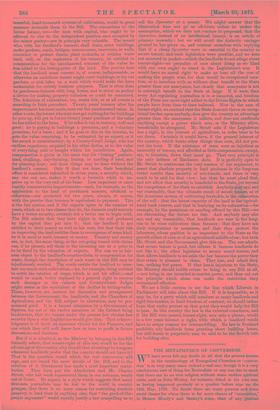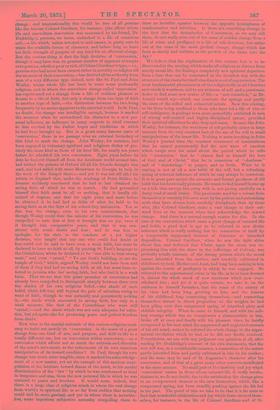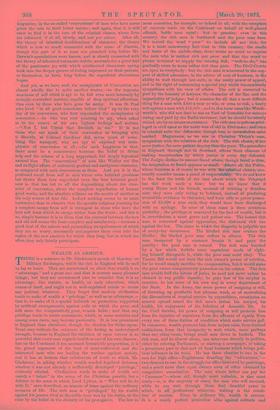THE METAPHYSICS OF CONVERSION.
WE have never felt any doubt at all that the process known in the terminology of Evangelical Churches as ' conver- sion ' is in very many cases indeed a real one, though it is a very mischievous sort of thing for Revivalists or any one else to teach that there can be no true religion without some sudden spiritual crisis, such as John Wesley, for instance, dated in his own case as having happened precisely at a quarter before nine on the 24th May, 1738. No doubt there are many persons and some social classes for whom there is far more chance of conversion,' in Messrs. Moody's and Sankey's sense, than of any gradual
change ; and unquestionably this would be true of all persons like the famous, Colonel Gardiner, for instance, (the officer whose life and marvellous conversion was recounted by his friend, Dr. Doddridge), persons, we mean, embarked in a life of conscious evil,—a life which, unless arrested in mid-career, is pretty sure to waste the available forces of character, and before long to leave too little strength of purpose of any kind for an effectual change. But the curious thing is that the high doctrine of conversion,' though it may have won its greatest number of apparent triumphs over persons, whether poor or rich, of Colonel Gardiner's type,—i.e., persons who had never been earnest either in morality or religion till the moment of their conversion,—has derived all its authority from men of a very different type indeed, men like St. Paul and John Wesley, whose whole life has been in some sense profoundly religious, and in whom the convulsive change called conversion' has represented not a change from a life of reckless pleasure or license to a life of faith, but only a change from one type of faith to another type of faith,—the distinction between the two being frequently by no means apparent to the external world. In St. Paul, no doubt, the change was intelligible enough, because it marked the moment when he surrendered his character to a new per- sonal influence, an influence in many respects in vivid contrast to that exerted by the Judaic hopes and traditions in which he had been brought up. But in a great many famous cases of conversion,' there is no passage over an external boundary of this kind to mark the change. John Wesley, for instance, had been engaged in voluntary spiritual and religious duties of pre- cisely the same kind as those of his later life, for nearly ten years before be admitted his own conversion. Eight years before its date he had cut himself off from the Academic world around him, had visited the prisons of Oxford till all his friends thought him mad, and had sailed with some Moravians to Georgia to help in the work of the Gospel there ;—and yet it was not till after his return to England that, under the teaching of Peter Bohler, he became suddenly convinced that he had at last obtained the saving faith of which he was in search. He had persuaded himself that faith must be all or nothing, that it hardly ad- mitted of degrees, and that for eight years and more before he obtained it he had had as little of what he held to be saving faith as in the days of his school-boy unconcern. Yet so fine was the change, even to his own consciousness, that though Wesley could date the minute of his conversion, he was compelled to note that at first it brought him no joy, even if it brought him comparative peace, and that it was con- sistent with much doubt and fear ; and he was fain to apologise for his state to the teachers of a yet higher doctrine, who taught that any one who could feel doubt or fear could not be said to have even a weak faith, but must be declared to have no faith at all, by quoting St. Paul's language to the Corinthians, whom he declared to be "not able to bear strong meat," and even "carnal," "Ye are God's building, ye are the temple of God," which, argued Wesley, could not have been said of them if they had had no saving faith at all, but must have re- ferred to persons who had saving faith, but who had it in a weak form. Thus we see that this great preacher of conversion had already been compelled to distinguish sharply between three very fine shades of his own religious belief,—the shade of mere belief, which left him still beyond the pale of salvation owing to want of faith, though he was earnestly and persistently seeking it,—the shade which amounted to saving faith, but only in a weak measure, like that of the Corinthians who were still 'carnal,'—and the shade which was not only adequate for salva- tion, but adequate also for producing peace and perfect freedom from doubt.
Now what is the mental rationale of this curious religious tend- ency to insist not merely on 'conversion' in the sense of a great change from one kind of aim, and purpose, and drift in life to a totally different one, but on conversion within conversion,—on a conversion which affects not so much the attitude and direction of the mind's movement, as the refinements of its own conscious manipulation of its inward condition ? St. Paul, though his own change was much more tangible, since it marked his acknowledge- ment of a new master, yet set the example of this anxious mani- pulation of the intricate inward drama of the heart, in-his careful discrimination of the " law " by which he was condemned as dead in trespasses and sins, from the new personal life in which he was restored to peace and freedom. It would seem, indeed, that there is a large class of religiobs minds in whom the real change from worldly to spiritual life is so far from sudden that nothing could well be more gradual, and yet in whom there is, neverthe- less, some imperious subjective necessity compelling them to draw an invisible equator between the opposite hemispheres of condemnation and salvation. Is there not something strange in- the fact that the metaphysics of Conversion, as we may call them, do not really arise out of the cases of sudden change from a life of crime and profligacy to a life of self-devotion, but rather
out of the cases of the most gradual change, change which has been as steady and uniform as the growth of the dawn into the day ?
We believe that the explanation of this curious fact is to be- discovered in the craving, which marks all religious as distinct from merely moral life, for finding a completely new spiritual departure from a base that can be contrasted in the broadest way with the structure of the character itself standing in need of regeneration. The most fundamental phenomenon of the religious life in all Churches and creeds is weariness, not to say sickness, of self, and a passionate desire to find some new centre of life—a "not-ourselves," as Mr. Arnold would say—which can renovate the springs and purify the aims of the soiled and exhausted nature. Now this craving, so far from being confined to those who have led a life of vice or self-indulgence, is perhaps even more powerfully exhibited in men- of strong self-control and highly-disciplined nature, provided their spiritual affections be also deep and warm. lumen like John Wesley, for instance, the weariness of self probably arises in large measure from the very constant fact of the use of the will in small
manipulations of the inner life. Nothing is more touching in john. Wesley's journal than the constant recurrence of lamentations
that he cannot permanently feel the new wave of emotion which swept over his mind about the period which he calls his "conversion," that he "cannot find in himself the love of God and of Christ," that he is conscious of " deadness " and of " wanderine... " in prayer, and so forth. What he is craving is not at all a new habit of the will, but a refreshing spring of external influence of which he may always be conscious. It is in great part against the accurate and formal goodness of old habit that his heart really protests. He wants to feel himself borne up on a tide that sweeps him away with it, not pacing carefully on a dusty road of small duties. The passionate used for a release from themselves is certainly felt even more by the patient and painstaking- souls that have always been carefully disciplined, than by those who, like Colonel Gardiner, make a vast change in their out- ward lives at the moment when they acknowledge the inward change. And there is a natural enough reason for this. In the case of the conversions which cause a great change of outward life and habit, a good deal is apt to be referred to new divine influence which is really nothing but the reassertion of itself by a temporarily suppressed element of character or inherited disposition. Colonel Gardiner, when he saw the light shine about him, and believed that Christ upon the cross was re- proaching him with his share in the sufferings of Calvary, was- probably totally unaware of the strong protest which the moral nature inherited from his mother, and carefully cultivated in childhood by both Mother and Aunt, had long been making in him against the course of profligacy in which he was engaged. He referred to this supernatural event in his life, as he at least deemed it, almost the whole stock of new emotions which now over- whelmed him ; and yet it is quite certain, we take it, on the evidence he himself furnishes, that the sense of the misery of his vices had been long growing on him, and the lessons- of his childhood long reasserting themselves,—and reasserting themselves almost in direct proportion to the weights he had been piling over that compressed spring of inherited piety and childish integrity. When he came to himself, and with the mili- tary courage which was so conspicuous a characteristic in him, broke off at once and finally with his pleasant vices, he hardly recognised in his new mind the suppressed and neglected currents- of his old mind; rather he referred the whole change to the super- natural revelation which he had, as he did not doubt, received. Nevertheless, no one with any judgment can question at all, after reading Dr. Doddridge's account of his own statements, that the new self was, in a considerable measure, a reassertion of the nature partly inherited from and partly cultivated in him by his mother ; and the same may be said of St. Augustine's character after his conversion, and of that of a great many other converts manifested in the same manner. No small part of the elasticity and joy which conversion' causes in those whose external life it really revolu- tionises is, we do not doubt, due to the satisfaction the change gives to an overpowered element in the men themselves, which, like a compressed spring, has been steadily pushing against the life led in the past. The proof of this we take to be that it is far rarer to find that wonderful exhilaration and joy which there showed them- selves, for instance, in the life of Colonel Gardiner and of St, Augustine, in the so-called 'conversions' of men who have never given the rein to their lower nature ; and again, that it is still rarer to find it in the case of the criminal classes, whose lives are reformed, if at all, slowly, and not per saltum. After all, the theory of inherited Modifications of character, the theory which is now so much connected with the name of Darwin, though this part of it at least was preached long before Mr. Darwin's speculations were known, and is closely connected with the theory of inherited automatic habits, accounts for a good deal of the passionate joy with which misdirected characters spring back into the deeper groove of feeling impressed on their parents, or themselves, or both, long before the superficial aberrations began.
And yet, as we have said, the metaphysics of Conversion are almost wholly due to quite another source,—to the supreine weariness of self which is apt to be felt even more intensely by strongly-controlled natures, capable of deep spiritual affections, than even by those who have gone far astray. It was St. Paul who lived "in all good conscience before' God" up to the very day of his conversion, who first expounded the' 'metaphysics of conversion ;—he who was ever yearning to saY, When asked as to the source of his own highest feeling's' and actiens, —" Not I, but Christ that dwelleth in me." It is not those who can speak of their conversion as bringing with it directly, as Colonel Gardiner did, seven years of some- thing like transport, who are apt to expound any meta- physics of conversion at all ;—for such happiness as that, there must be a concurrence between the belief 'in divine help and the release of a long suppressed, but deeply ingrained natural bias. The "conversions" of men like Wesley are dim and twilight affairs of extremely gradual and ambigtious character, as compared with such conversions as these. And yet it is the profound recoil from self in men whose own habitual goodness has shown them how superficial even the best habitual good- ness is, that has led to all the dogmatising about the char- acter of conversion, about the complete repudiation of human good works, and the absolute reliance on the merits of another as the only source of true life. Indeed nothing seems to us more instructive than to observe that the specific religious yearning for a complete escape from self is strongest in those who have the best self from which to escape rather than the worst ; and this is so, simply because it is in them that the contrast between the new and old self seems the least complete and satisfactory,—because a good deal of the minute and painstaking scrupulousness of which they are so weary, necessarily accompanies them even into the region of the new emotion for which they long, but in which too often they only faintly participate.




































 Previous page
Previous page